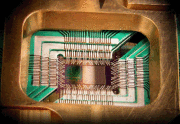 Defense contractor Lockeed Martin Corp. is betting big on the promise of quantum computing.
Defense contractor Lockeed Martin Corp. is betting big on the promise of quantum computing. The company recently shelled out big money to Canadian firm D-Wave for the world's first commercial quantum computer.
D-Wave says quantum computers can be used to solve hard problems that ordinarily take too long even for supercomputers. Some examples: Financial risk analysis, object recognition in images, computer vision, and bioinformatics -- the types of analytical thinking that people are good at, but computers find difficult.
The shiny new D-Wave One sold to Lockheed Martin comes with a team of researchers who will work closely with the company in the years ahead to get the most from the system. The companies were mum on the purchase price.
Not everyone is a believer in the technology.
It's hard to prove that quantum computing is even taking place. But D-Wave claims to have realized "quantum annealing" in its hardware, as reported in the science journal Nature. Still, there are some scientists who remain skeptical about D-Wave's claims.
 The D-Wave One is built around the Rainier processor. It comes in a room-sized cabinet with a 100-square-foot footprint, which houses the extensive shielding required for quantum computing to work, as well as supercooling hardware.
The D-Wave One is built around the Rainier processor. It comes in a room-sized cabinet with a 100-square-foot footprint, which houses the extensive shielding required for quantum computing to work, as well as supercooling hardware. D-Wave is no stranger to the technology industry.
It recently worked with Google to produce software that can recognize automobiles within images. D-Wave's computers actually created algorithms that are being used on mobile phones for that purpose.
D-Wave One offers an application programming interface (API) that can be used to easily feed calculations to the beast via popular programming languages like C++ and Java.
Quantum computing isn't expected to reach the rest of us anytime soon, but if history is any guide there's little doubt the technology will be used more in the future.
You can learn more about quantum computing from D-Wave Chief Technology Officer Geordie Rose's Google Talk on the subject. Google engineer and respected computational neurobiology scientist Hartmut Neven has also given a talk on the same subject.
No comments:
Post a Comment